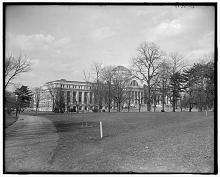12th Scripps National Spelling Bee
| 12th National Spelling Bee | |
|---|---|
 | |
| Date | May 26, 1936 |
| Location | National Museum in Washington, D.C. |
| Winner | Jean Trowbridge |
| Age | 13 |
| Residence | Iowa |
| Sponsor | The Des Moines Register and Tribune |
| Sponsor location | Des Moines, Iowa |
| Winning word | eczema |
| No. of contestants | 17 |
| Pronouncer | H.E. Warner and Harold F. Harding[1] |
| Preceded by | 11th Scripps National Spelling Bee |
| Followed by | 13th Scripps National Spelling Bee |
The 12th National Spelling Bee was held in Washington, D.C. on May 26, 1936, at the National Museum. Scripps-Howard would not sponsor the Bee until 1941.
The winner was Jean Trowbridge, age 13, of Iowa, with the word eczema. Thirteen-year-old Bruce Ackerman, of Tazewell County, Illinois, who took 3rd the prior year, came in second. Catherine Davis, 13, of Indiana took third, falling on "shrieking."[2][3]
In the final rounds, Trowbridge was first disqualified for "numskull," which Ackerman then spelt as "numbskull" followed by "gnome" for the apparent win. The judges then realized that "numskull" was an acceptable spelling, and the contest continued. Ackerman misspelled "predilection" a few words later, which Trowbridge spelled correctly followed by "eczema" for the win.[3]
The final hour of the competition was broadcast on radio on the Columbia broadcasting system.[4]
First Black finalists
MacNolia Cox, a 13-year-old girl from Akron,[5] and Elizabeth Kenny, a 15 year old from Plainfield, New Jersey, were the first African-American children to compete as finalists in the National Spelling Bee—and Cox made it to the final five.
Due to segregation, Cox had to move into a black-only train car when she crossed into Maryland, and was unable to stay at the Willard Hotel with the other spellers. Cox and her mother were also placed at a separate table at the contestants banquet.[6] Cox was eliminated on the word "nemesis," and her schoolteacher and newspaper sponsor representative both protested the word as being a proper noun (Nemesis being a Greek goddess of retribution). However, the protest was denied as the word can also be used as a common noun.[7] Some have since suggested that Cox was intentionally given an unapproved word (a capitalized word); any claims of racial bias were denied at the time, but are not surprising considering the segregated treatment that she received.[8][9]
In 2004, poet A. Van Jordan published the book of poems "M-A-C-N-O-L-I-A" based on Cox's life experiences.[10][9][11]
References
- ↑ (19 May 1936). Article, Courier-Journal ("Alternating as pronouncers will be Dr. H.E. Warner and Prof. H.F. Harding.")
- ↑ (30 May 1936). Best Speller Stumbles over Word Nemesis, The Afro American
- 1 2 (27 May 1936). Dictionaries Help Crown Iowa Girl Spelling Champ, Daily Illini
- ↑ (23 May 1936). Portland Boy Entrant in Nat'l Spelling Bee, Lewistown Daily Sun
- ↑ Halpin, Mary Rita (18 May 1936). Ohio and Tennessee Select Girls for Spelling Contest, Nassau Daily Review
- ↑ Chesley, Mabel Norris (1 November 1975). Spelling Bee A Big Event, Daytona Beach Morning Journal (memories of Akron reporter of 1935 contest)
- ↑ (30 May 1936). Best Speller Stumbles over Word Nemesis, The Afro-American
- ↑ Hildebrand, Lee (5 December 2006). When one path narrowed, she took another to life as blues pianist, San Francisco Chronicle
- 1 2 Hirsch, Edward (13 June 2004). A. Van Jordan combines the ... , The Washington Post
- ↑ Romain, Michael (20 May 2015). The tragedy of MacNolia Cox, OakPark.com
- ↑ Olson, Sean. Poetic Justice, UNCG Research (Spring 2006)